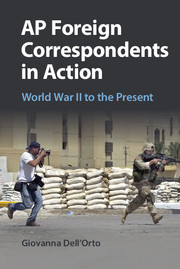Book contents
- Frontmatter
- Dedication
- Contents
- List of Figures
- Acknowledgments
- 1 Introduction
- 2 Getting Ready, Getting Started, and Getting Lost in Translation
- 3 What's the Story? News Judgment, News Pitches
- 4 Getting to the Sources (and Keeping Them Alive)
- 5 Being an American Abroad – Perceptions of Journalists
- 6 Eyewitness Reporting: Getting to the Scene
- 7 The Costs of Being There to Count the Bodies
- 8 Your Byline Today, Mine Tomorrow: Teamwork and Competition
- 9 Access, Censorship, and Spin: Relating with Foreign Governments
- 10 Flacks, Spooks, GIs, and Objective Journalists: Relating with the U.S. Government Abroad
- 11 Getting It Out, Getting It Edited: Filing News, Working with the Desk
- 12 The Evolving Milkmen: Writing for an Audience
- 13 Purpose and Influence of Foreign Correspondence
- 14 Eight Decades of Bearing Witness and Telling the World's Stories: Conclusions
- Bibliography
- Index
9 - Access, Censorship, and Spin: Relating with Foreign Governments
Published online by Cambridge University Press: 05 November 2015
- Frontmatter
- Dedication
- Contents
- List of Figures
- Acknowledgments
- 1 Introduction
- 2 Getting Ready, Getting Started, and Getting Lost in Translation
- 3 What's the Story? News Judgment, News Pitches
- 4 Getting to the Sources (and Keeping Them Alive)
- 5 Being an American Abroad – Perceptions of Journalists
- 6 Eyewitness Reporting: Getting to the Scene
- 7 The Costs of Being There to Count the Bodies
- 8 Your Byline Today, Mine Tomorrow: Teamwork and Competition
- 9 Access, Censorship, and Spin: Relating with Foreign Governments
- 10 Flacks, Spooks, GIs, and Objective Journalists: Relating with the U.S. Government Abroad
- 11 Getting It Out, Getting It Edited: Filing News, Working with the Desk
- 12 The Evolving Milkmen: Writing for an Audience
- 13 Purpose and Influence of Foreign Correspondence
- 14 Eight Decades of Bearing Witness and Telling the World's Stories: Conclusions
- Bibliography
- Index
Summary
From Mao in the Yan'an caves to Nelson Mandela at a rally, from Pope John Paul II on his plane to rebel groups in jungles and desert hideouts, correspondents have interacted with all kinds of foreign leaders and opposition groups. This chapter explores how they obtained access to them around the world, from breaking through opaque bureaucracies to organizing meet-ups with insurgents by following trails of instructions hidden in tree trunks to negotiating the opening of bureaus in such closed regimes as North Korea. Governments have also used the denial of access as retaliation against negative coverage, in a widespread effort to control news. One of the most disturbing findings is the level of surveillance and censorship that correspondents have been, and continue to be, subjected to around the world, sometimes resulting in expulsions and detentions that block stories from reaching the wire, at least temporarily. Correspondents also face the opposite concern – how to avoid spin, staged access, and being manipulated for propaganda purposes, which leaders from Nicolae Ceaușescu to the Khmer Rouge all attempted.
Getting Access to Foreign Leaders
The earliest access conversation between AP and foreign leaders concerned the most basic logistical issue: can a bureau be set up? In Havana in the 1960s as in Pyongyang in the 2010s, correspondents (and executives) worked hard to obtain permission to open an AP office. Bilingual Ike Flores (1–2) was editing on the foreign desk and traveling through the Caribbean in the mid-1960s, shortly after the Bay of Pigs and the missile crisis, when he and “the AP brass,” through “much give-and-take” via the Czechoslovakian Embassy in Washington, “succeeded in convincing the Cuban regime … that they needed to speak to the world” – and that “we were objective, that we would give the good as well as the bad of the Cuban Revolution.” Flores’ first short visa kept being extended for almost two and a half years. Both Flores and his successor, John Fenton Wheeler, wrote analytical pieces on Cuba's basic struggles, including food shortages, sometimes juxtaposing the rosy regime predictions with matter-of-fact complaints by a Havana cleaner and a woman in a cattle-producing province.
- Type
- Chapter
- Information
- AP Foreign Correspondents in ActionWorld War II to the Present, pp. 237 - 263Publisher: Cambridge University PressPrint publication year: 2015



